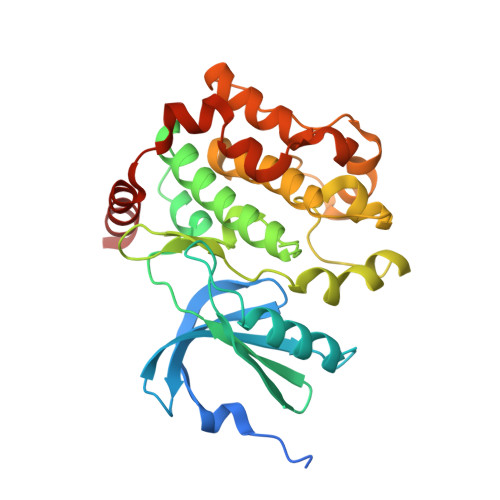Synthesis of Pyrazole-Based Macrocycles Leads to a Highly Selective Inhibitor for MST3.
Amrhein, J.A., Berger, L.M., Balourdas, D.I., Joerger, A.C., Menge, A., Kramer, A., Frischkorn, J.M., Berger, B.T., Elson, L., Kaiser, A., Schubert-Zsilavecz, M., Muller, S., Knapp, S., Hanke, T.(2024) J Med Chem 67: 674-690
- PubMed: 38126712
- DOI: https://doi.org/10.1021/acs.jmedchem.3c01980
- Primary Citation of Related Structures:
8QLQ - PubMed Abstract:
MST1, MST2, MST3, MST4, and YSK1 are conserved members of the mammalian sterile 20-like serine/threonine (MST) family that regulate cellular functions such as proliferation and migration. The MST3 isozyme plays a role in regulating cell growth and apoptosis, and its dysregulation has been linked to high-grade tumors. To date, there are no isoform-selective inhibitors that could be used for validating the role of MST3 in tumorigenesis. We designed a series of 3-aminopyrazole-based macrocycles based on the structure of a promiscuous inhibitor. By varying the moieties targeting the solvent-exposed region and optimizing the linker, macrocycle JA310 ( 21c ) was synthesized. JA310 exhibited high cellular potency for MST3 (EC 50 = 106 nM) and excellent kinome-wide selectivity. The crystal structure of the MST3-JA310 complex provided intriguing insights into the binding mode, which is associated with large-scale structural rearrangements. In summary, JA310 demonstrates the utility of macrocyclization for the design of highly selective inhibitors and presents the first chemical probe for MST3.
Organizational Affiliation:
Institute of Pharmaceutical Chemistry, Goethe University Frankfurt, Max-von-Laue-Str. 9, 60438 Frankfurt am Main, Germany.


















